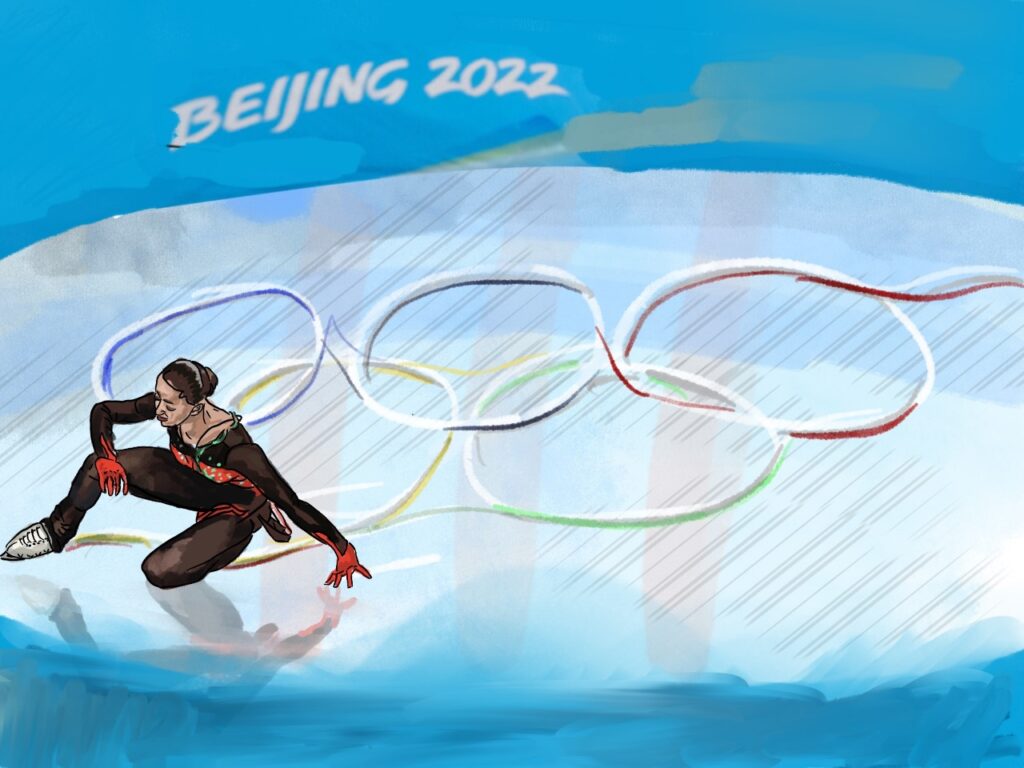
Graphic by William Gao/The Choate News
On February 8, it was revealed that Kamila Valieva, a 15-year-old figure skater for the Russian Olympic Committee (ROC) and the favorite to win the gold medal, had tested positive for the banned performance-enhancing drug trimetazidine. Trimetazidine purportedly improves endurance by increasing blood flow efficiency. It was found in a blood sample from December 25.
To the surprise of many viewers, she was still allowed to compete, but after a poor performance in the free skate, she finished in fourth place. The athlete’s emotional meltdown following the announcement of her score reminded the audience of her — often disregarded — young age and the high-pressure scenario of Olympic competition. Unfortunately, the fame and glory that young athletes gain is inevitably matched with incredible shame and damage to their health and self-esteem. The mental toll can be especially taxing for athletes placed in the spotlight for negative reasons during the Games. This raises an important question of whether or not athletes as young as 15 should be allowed to compete in these intense competitions.
Eteri Tutberidze, Valieva’s coach, has produced the gold and silver medalists in the individual event for the two most recent Olympics. Tutberidze is particularly renowned for her ability to teach women difficult quadruple jumps — which, as the name suggests, involves the skater completing four revolutions in the air. Quads, as they are called for short, are so rarely performed and worth so many points that they virtually guarantee a win in the women’s event if landed successfully. Almost all of the women who consistently perform quads right now, including Valieva, are coached by Tutberidze.
Although it might seem inspiring that the limits of the human body are being pushed with the increasing frequency of quad jumps, the quad revolution has been accompanied by a startling decrease in the age and career length of female skaters. Tutberidze skaters use a jumping technique that relies on low, prepubescent body weight for faster rotation in the air. This technique makes them particularly prone to injury if they continue to use this technique after puberty. Most, such as the 2018 champion Alina Zagitova, peak in their first year of eligibility, when they are 15 years old, and retire after a couple of years.
Many fans and commentators of the sport have advocated for raising the minimum age of eligibility to encourage skaters and coaches to use techniques that prevent injury and promote long careers. Valieva’s case, however, illustrates an even more compelling reason for raising the minimum age. In all likelihood, 15-year-old Valieva did not seek out cardiac glycosides herself; with or without her knowledge, they were provided to her by her coaches or doctors. Young athletes are often unable to recognize abusive or outright illegal practices when they are occurring, and thus, are more vulnerable to objectification and abuse by authority figures.
Valieva’s potential ignorance to her intake of Trimetazidine is somewhat reminiscent of the USA Gymnastics scandal, in which hundreds of gymnasts came forward as survivors of sexual abuse at the hands of the team doctor, Larry Nassar. The gymnasts described not knowing if Nassar’s so-called “therapies” might have been legitimate and being scared to ask questions for fear that it would impact their chances at being selected for competitions. Rachael Denhollander, the first woman to publicly accuse Nassar of assault, stated in an interview with Reuters, “What we’re really seeing is the incredible damage that has come yet again to a child who has been under the control of adults who value her, not for who she is but for what she can produce for them.”
Gold medals won by young athletes have a tremendous effect on a country’s national pride. The pressure to perform is so immense that skaters like Valieva may be driven to take drugs that would enhance their performance. Raising the minimum age in figure skating may have a positive impact on young athletes, but it won’t solve the broader issue — the unbearable pressure faced by athletes competing for their countries. All of us contribute to this when we tune in to the broadcasts every four years; thus, it is also our responsibility to learn to value the athletes, not just the medals that they win.




